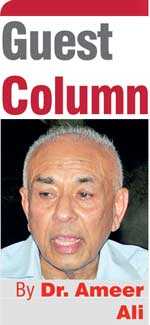Saturday Feb 28, 2026
Saturday Feb 28, 2026
Monday, 9 September 2019 00:00 - - {{hitsCtrl.values.hits}}
Conducting elections for the presidency or Parliament or Provincial Councils is a hugely expensive affair. The Chief Financial Officer of Sri Lanka’s Election Commission recently reported that it would cost an estimated Rs. 4 billion to conduct any one of these elections, which means the total cost of all three would be an estimated Rs. 12 billion. This is the price the nation pays to preserve its majoritarian democracy and it comes from the National Budget.
Although this itself is a substantial sum given the parlous state of the country’s finances, and diverts precious resource from flowing into other productive sectors, it is only the direct cost incurred by the Election Commission. In addition to this, there are indirect or hidden costs arising from electioneering and incurred by the contesting parties and candidates to ‘buy votes’. In the absence of any campaign finance regulations the indirect costs are inestimable and may be colossal. It has a pernicious effect on the economy and governance. 
From the point of view of the parties and their candidates, money they spend on electioneering is a form of investment incurred with the expectation of greater return, once the contest is won. It is a gamble. However, unlike in a casino where the size of the winnings are known before the bet is placed and winnings are collected immediately after the game, in politics, the size is of the winnings is unknown and is collected over a period of time depending on a number of variables, such as the status the winner would hold in the government after the victory, the ethical, moral and intellectual standards of the holder and the type of friends and supporters he or she had cultivated during the campaign.
These winners are paid salaries when they hold office and enjoy a variety of perks associated with the position they hold. They are also entitled to a pension when they leave position. Yet, how does one explain the enormous wealth they accumulate while in office? Are they made accountable for their accumulation? How many of them at least pay their taxes properly?
There is huge a discrepancy between the size of wealth of some parliamentarians when they enter and when they leave. I once happened to meet a candidate who was contesting a parliamentary seat in the Eastern Province. He confided to me that he had sold every asset he possessed except the house he was living in to meet his electioneering expenses, and he asked me to pray for his victory so that he could “serve” his people.
Even without my prayer he won the contest and became a cabinet minister. At the end of his political career after a decade he emerged as one of if not the richest in his district. How did he accumulate all that wealth? Today there are hundreds of politicians who have amassed wealth beyond their natural capabilities simply by using their political power and status. This needs to be controlled.
The problem with this type of acquisition is the pernicious effect it has on the economy and governance of the country. Transparency International ranks countries according to a corruption index ranging from 0 (very corrupt) to 100 (very clean). Between 2002 and 2018 Sri Lanka averaged 31 and in 2019 it has added another seven points to total 38, which means the country has improved a little, but still a long way to go. Out of a total of 180 countries Denmark is the least and Somalia the most corrupt nations. Sri Lanka ranks 89th.
Electioneering without any control over campaign financing worsens corruption and allows it to originate from the top. If rulers and administrators are honest and clean any corruption detected at the bottom can be eradicated easily. In contrast, when the top is incorrigibly corrupt and dishonest there is no hope for clean governance. Corruption percolates downwards, increases hidden costs and affects the entire polity and economy.
If the public sector is corrupt private sector will automatically become corrupt, because at several points the two will come into contact and the virus will cross pollinate. Corruption at the top also creates cronyism. They are inseparable twins. An economy that operates in an environment of corruption cannot expect to remain competitive with an open economy and cannot sustain respectable rates of economic growth.
The economics of electioneering in such an environment without stringent rules and control over campaign donations is perverse. If the situation continues Sri Lankan democracy will be a sham and elections a gamble. Democracy in the hands of kleptocrats eventually turns into kakistocracy.
Given the current state of electioneering for presidency, JVP appears to be the least resourceful party in terms of finances. There are powerful business and media interests that are prepared to spend for the UNP, SLFP and SLPP whether they contest independently or in coalition. These interests would naturally expect a decent return for their campaign outlay. The three parties will be compelled to bend rules and behave corruptly to enable their donors and financiers to make quick bucks. In doing so the legislators and executors will take their own cut.
Voters are already aware of how the economy was looted by the former regime and how corruption was perpetuated under the present regime. In that respect JVP is relatively clean. It has no money to spend on lavish campaigns except meagre donations, if any, from its membership cadre. Hence, it has the least incentive to perpetuate corruption. AKD naturally deserves a chance to clean up corruption and rebuild the economy by fostering national unity to which he has already made a commitment. The country eagerly waits to read its full manifesto.
(The writer is attached to the School of Business and Governance, Murdoch University, Western Australia.)